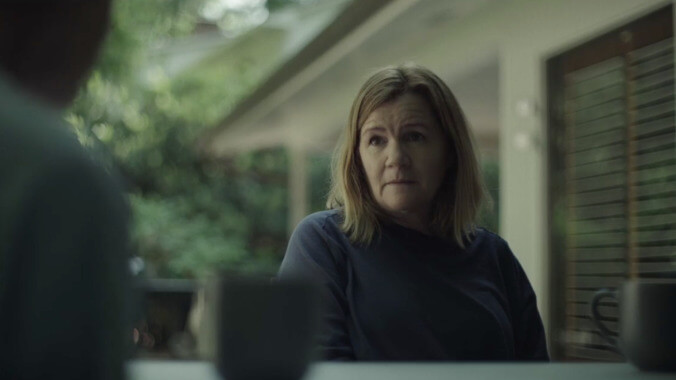Mare Winningham Screenshot:
When The Outsider stays close to home—and especially when The Outsider’s Outsider doesn’t merely stay close, but invades—it’s as vivid, unsettling, and thematically rich as anything else on television. How do you identify the line between setting fear aside and ignoring your most primal survival instincts? Can grief be shared, or is it always a solitary pursuit, even when it looks to be otherwise? What compels people to commit acts of pure evil, and what do they gain from it? It’s rich stuff, there to be mined from every episode of this series so far, and of most of its scenes.
Yet in “Tear-Drinker,” that richness is thinned considerably. Adaptation is a delicate thing—books are not movies or TV shows, and rarely work exactly as written when translated to the screen—and the primary challenge those tasked with adaptation must face can be insurmountable or something for which the writer can vastly overcompensate. That’s what seems to be happening in the first hour of The Outsider in which its meditative pace feels not like the slow stalking of a predator, but like Holly Gibney’s car, stalled on the highway in a traffic jam. It’s not moving, but hey, everything around it is barely moving, either.
You don’t have to have read Stephen King’s novel to have the sense that The Outsider is spinning its wheels a bit. That’s something even the show seems to acknowledge. Alec reminds Howard, Ralph, and Yunis that it’s a slow game they’re playing, one that requires a lot of retracing your steps. The first city takes you to another city, which takes you back to the first; you revisit places, ideas, people, and evidence again and again, like Ralph watching Claude meet Terry Maitland (“Terry Maitland”) at the Peach Pit* over and over.
It doesn’t feel productive, but for these people, chasing this impossible story and its impossible monster, it is. And in some cases, that’s true for the show, too. It tells us a lot about both Holly and Ralph that they’re so dogged, that they check and double-check, confirming the unreal thing in front of them is, in fact, real. It tells us about their state-of-mind. In the case of Claude, it’s showing us someone who knows, deep down, that something is wrong, and shakes it off again and again, putting off the call he knows he needs to make. (Paddy Considine is great.)
It makes sense when you’re thinking about the emotional lives of the characters, and in some cases, the frustrated feeling the pace invokes plays a key role in the storytelling, like Holly walking around and around and around her coffee table. But in terms of the overall experience of watching the show, we’re that car, stopped in traffic. And that’s where Richard Price’s decision to (apologies, unavoidable mentions of the book here) add considerably to the narrative of the novel proves to be a stumbling block. They’re stuck, but they have to do something, and whatever they’re doing needs context, so we watch Holly Gibney’s car break down, and we watch the Outsider’s previous sunburned target struggle with his grief, and we see Tamika get in Jack’s face again, with the same distant, befuddled response. There are precious few moments in this episode in which the plot moves at all, and nearly all of them could have been milked for more, but instead, Price widens his focus, rather than going deeper.
The result is a scene in which Holly convinces her friendly hotel bartender to drive her around the next day, only for that bartender to never have another line in the episode. We see Jack yelling about a lamp and dragging another deer carcass into the woods and learn precious little that’s new. We visit three graveyards to get to the moment when Yunis notices that the creepy belt-buckle barn in the distance. It’s not as though nothing happens. Jeannie Anderson gets a truly terrifying visit from the Play-Doh Faced Man, a development that stirs up all kinds of stuff in the Anderson marriage; Holly identifies where the Outsider might hole up, and figures out that in Ohio at least he had some assistance from some guilt-stricken party; she also gets laid, and the former cop who woke up alone in her hotel room finds some notes and begins to do some detecting of his own.
But the main event is that not-nightmare Jeannie has, another sharp spike of tension and fear in a mask of calm that’s already fracturing. Mare Winningham does a terrific job of underplaying Jeannie’s obvious terror, and an even better job of connecting it to wounds of the recent past. She can’t endure another loss; she can’t handle being patronized or dismissed; all she can do is draw the face she saw and hand it to her husband without explanation. Then she limps, alone, to get another wound stitched.
“Tear-Drinker” could spend more time with Jeannie—her fear, her confusion and frustration, the old injuries that haven’t healed as well as she thought. It could spend more time with Ralph, refusing to believe what some part of him knows to be true, worrying about his wife’s mental state, and his own. Instead, a car breaks down in traffic, and we sit there with it, not necessarily in a hurry to get anywhere, but wishing that at the very least, we were moving.
Stray observations
- * — It is the Peach Pit, right? In the book it’s Gentlemen Please, but at some point in the last week it struck me that the name changed. I wonder why that is.
- They’re just never going to call him the Play-Doh-Faced Man, are they? Alas.
- “Dreams are messages, bro.”
- This show might be the worst offender in the category of no-one-says-goodbye-on-phone calls I’ve ever seen, but with Holly at least it makes sense.

